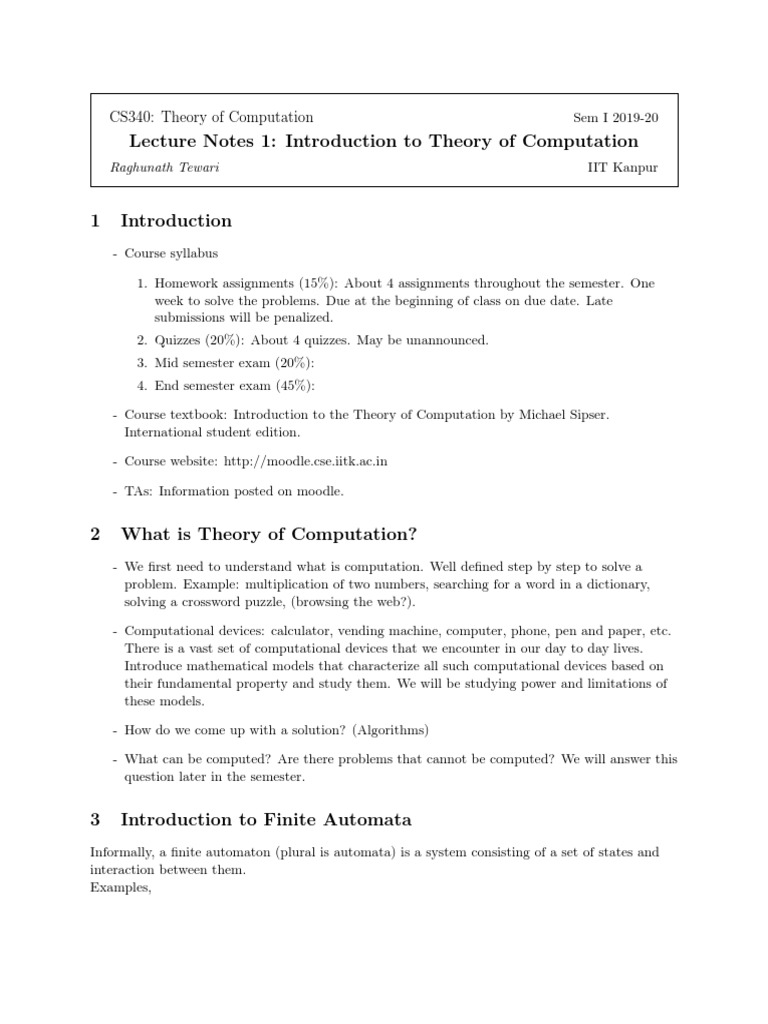Theoretical computation stands as a foundational pillar in computer science, encompassing a vast landscape of ideas, principles, and problems that probe the very limits of what can be computed. At its core, it philosophizes about computation itself, asking profound questions about the nature of algorithms, complexity, and decidability. This reflection prompts an intriguing scenario: If computation is fundamentally a manipulation of symbols according to prescribed rules, what can we truly say about the capabilities and limitations of machines—be they human or mechanical?
To embark on this intellectual journey, it is essential first to delineate what falls under the umbrella of theoretical computation. It is an intersection of mathematics, logic, and computer science, fundamentally concerned with the computational aspects of abstract models. These models may include finite state machines, Turing machines, and lambda calculus, each providing unique lenses through which we can explore computation. By examining these theories, we learn that some problems are surmountable, while others slip just beyond the grasp of even the most sophisticated algorithms.
One vital question arises in this area: what constitutes an algorithm? Formally, an algorithm is a finite sequence of well-defined instructions that yield a desired output from a given input. Yet, as we delve deeper, we encounter intriguing classes of problems. Some can be solved algorithmically in polynomial time, while others, known as NP-complete problems, present more complex challenges. Specifically, consider the traveling salesman problem: Can a traveling salesman devise a route that visits a given set of cities, returning to his starting point, while minimizing the total distance traveled? This classic problem opens the door to exploring the intricacies of computational efficiency and optimality.
A fundamental aspect of theoretical computation is the classification of problems based on their computational feasibility. The field delineates problems into categories such as P (problems solvable in polynomial time), NP (nondeterministic polynomial time), and NP-hard problems (at least as hard as the hardest problems in NP). This classification becomes crucial when considering the practical applications of computation. What if one could prove that a given problem is NP-hard? This revelation could significantly alter how we approach algorithm development, leading to innovative heuristic methods or approximation algorithms that deliver suboptimal but practically achievable solutions in a reasonable time frame.
Progressing further, we encounter the Church-Turing thesis, an essential hypothesis positing that any computational problem that can be effectively solved by a human can also be solved by a Turing machine. While this thesis profoundly influences the philosophy of computation, it prompts a compelling challenge: Are there functions that can be computed by human beings but remain beyond the reach of Turing machines? This inquiry escalates into a philosophical domain, intimating that our understanding of computation might be limited by the constraints of computational models themselves.
In exploring the decidability of problems, the notion of halting becomes paramount. The Halting Problem, proposed by Alan Turing, posits that there is no general algorithm that can determine whether an arbitrary program will halt or run indefinitely. This theorem establishes a boundary between computable and non-computable functions, fostering discussions surrounding the very essence of algorithmic predictability. It is a striking reminder of the limitations inherent in computation and serves as an impetus for further inquiry into the realms beyond our computational reach.
Moreover, theoretical computation intersects significantly with the realms of complexity theory, exploring how resources such as time and space impact algorithm efficiency. The exploration of complexity classes, namely P, NP, and beyond, leads to the realization that the resources required for computation can be abstract yet have tangible implications in actual computation. For instance, as the size of input data escalates, the differential between polynomial and exponential time complexities can be monumental. This fact essentially means that some problems become practically unsolvable within reasonable time constraints as input sizes grow, even if they are theoretically solvable.
Turning towards computability, we must also consider the intriguing concept of interactive computation, which involves the interaction of an agent or a system with its environment. This idea extends the classical definition of computation by incorporating elements of dynamic decision-making, thereby addressing scenarios in which computational processes do not operate in isolation but rather in synchrony with other systems. Such considerations raise countless questions: Can we design algorithms capable of learning and adapting to changes? What frameworks govern the success of interactive computation?
Finally, theoretical computation invites us to entertain future possibilities, particularly with the rise of quantum computing. What if computation transcends its classical confines through quantum principles? In this hypothetical framework, problems deemed intractable may become solvable within polynomial time, manifesting a paradigm shift in our approach to computational challenges. With such inquiries, we find ourselves at the frontline of a computational revolution—a challenge that beckons further exploration and understanding.
In conclusion, theoretical computation is more than mere abstractions; it is a profound inquiry into the nature and limits of computation itself. From the algorithmic intricacies to philosophical musings on decidability and complexity, it persists as an expansive domain filled with both rigorous challenges and tantalizing possibilities. As researchers continue to explore these frontiers, the question remains: What new landscapes will emerge from our understanding of theoretical computation? Will we discover algorithms that unlock previously inaccessible problems, or will we find that the most exciting inquiries reside in the very limitations that define the frontier of computability?












